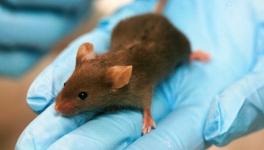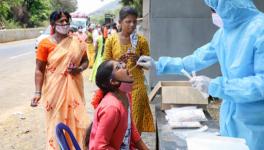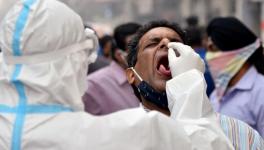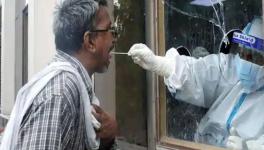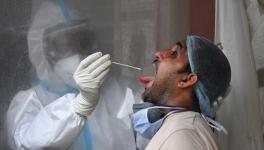Chinese Scientists Suspect Exotic Pangolins May've Aided Spread of Coronavirus
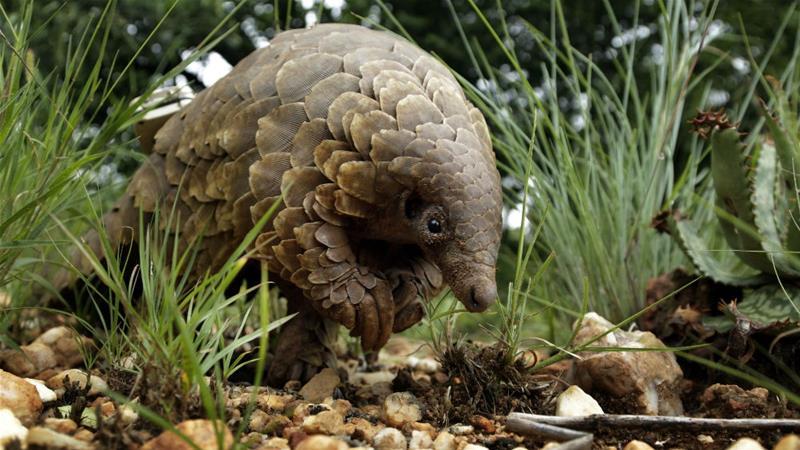
Image Courtesy: AP
Beijing: After snakes and bats, Chinese scientists now suspect pangolins may be an intermediate host of the novel coronavirus which is wreaking havoc all over China and the world.
As of Thursday, 636 people have died mostly in Hubei province and its provincial capital Wuhan due to the virus with the total number of confirmed cases jumping to 3,143, Chinese officials announced on Friday.
The genome sequence of the novel coronavirus strain separated from pangolins was 99% identical to that from infected people, indicating pangolins may be an intermediate host of the virus, according to a new study led by the South China Agricultural University.
According to Liu Yahong, president of the university, the research team analysed more than 1,000 metagenome samples of wild animals and found pangolins as the most likely intermediate host, state-run Xinhua news agency reported on Friday.
Molecular biological detection revealed that the positive rate of Betacoronavirus in pangolins was 70%.
Researchers further isolated the virus and observed its structure with an electron microscope. They found that the genome sequence of the coronavirus strain was 99% identical to those in infected people, the study said.
Results showed that pangolins are a potential intermediate host of the novel coronavirus, Liu said, adding that the study will support the prevention and control of the epidemic, as well as offer scientific reference for policies on wild animals.
After the coronavirus, China has temporarily banned trading exotic animals.
Birds and animals are in the centre of the debate about how the virus originated. In the beginning, snakes were blamed for the virus.
Chinese health experts later contended that the virus originated from bats, but whether there are more intermediate carriers between bats and humans requires further investigation.
The virus was believed to have been spread from Wuhan's Hunan seafood wholesale market.
Shen Yongyi, a professor with the university and a member of the research team, said previous research had found the new coronavirus originated in bats, but as the spread of the virus happened in winter, it was unlikely that people had been directly infected by bats which were hibernating.
"So our task is to find the intermediate host that 'bridges' bats and people," he said, adding that there are usually multiple intermediate hosts, and pangolins may be just one of them.
“On the one hand, we hope this result will warn people to stay away from wild animals. On the other, we would like to share it with research fellows in the hope of making efforts together to find other possible intermediate hosts to promote the epidemic prevention and control," he said.
Grief, Anger Over Whistleblower Doc’s Death
China's anti-graft watchdog on Friday launched a probe into the death of a whistleblower doctor who was reprimanded by police for spreading "rumours" about the coronavirus outbreak in China that has claimed over 630 lives, amid an outpouring of global grief and anger over his demise.
China's ruling Communist Party has sent a high-level investigation team to the epidemic-hit Wuhan city in Central Hubei province to probe Li Wenliang's death on Thursday.
Li, 34, was among eight Wuhan residents who were reprimanded by local police in early January for spreading "rumours" about the outbreak of the novel coronavirus in the province.
The doctor died due to the very virus he desperately tried to highlight in December last year through social media and has become a national icon with millions of netizens expressing their grief and anger over the way he was treated.
His death is widely reported by the state-run media which had earlier shunned him.
A special team will head to Wuhan to investigate issues regarding Li, state-run People's Daily quoted China's top anti-corruption agency as saying on Friday.
The action has been approved by the central government and the team will have a comprehensive investigation into matters related to the deceased doctor, China's National Supervisory Commission said in a statement.
Li's death has been mourned by the National Health Commission.
The police reaction in stifling his warning of coronavirus which now has become a national and international disaster has evoked public resentment.
The doctor's death triggered an outpouring of millions of comments on China's social media sites as well as concerns from the international community.
"We are deeply saddened by the passing of Dr Li Wenliang. We all need to celebrate work that he did on 2019nCoV," the World Health Organisation (WHO) tweeted.
According to his post on Weibo on December 30, Li, an ophthalmologist at the Central Hospital of Wuhan, warned in the online chat group WeChat that he had seen a report that showed positive test results of SARS for seven patients.
On January 3, Li and the seven others were summoned by Wuhan police for "spreading fake information on the internet", state-run China Daily reported.
They were reprimanded but not fined or detained, it quoted police as saying. Li continued his normal work at the Wuhan hospital until January 10 when he came down with cough and fever, symptoms of the coronavirus.
"I was finally confirmed as being infected by the novel coronavirus," Li wrote on February 1 on Weibo, adding a dog emoji.
The post got more than 1.6 million thumbs-ups and over 400,000 netizens expressed their best wishes for him.
On Thursday evening, several Weibo posts said Li had died from the novel coronavirus and the updates went viral on social media, sparking immense sorrow and outrage among netizens.
Significantly, during midnight the Central Hospital of Wuhan denied Li had died, saying he was critical and under emergency treatment. The post soon attracted millions of netizens to pray for the doctor.
“I won't sleep tonight!!! Wait for a miracle online!" said one comment that received 350,000 thumbs-up.
A top epidemiologist at the Chinese Centre for Disease Control and Prevention (CCDC) told state-run Global Times that "we should highly praise the eight Wuhan residents".
"They were wise before the outbreak," Zeng Guang, chief epidemiologist at the CCDC, said, adding that any judgment, though, needs to be backed by scientific evidence.
Get the latest reports & analysis with people's perspective on Protests, movements & deep analytical videos, discussions of the current affairs in your Telegram app. Subscribe to NewsClick's Telegram channel & get Real-Time updates on stories, as they get published on our website.









